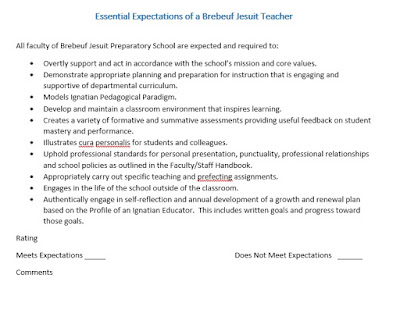Every year, the Principal’s Office participates in a 360
evaluation process. An online
performance survey is sent to the faculty and staff on a random administrator
for feedback. The survey is anonymous and
asks various questions about our communication, leadership, and ethical
character. Last year, someone wrote on
mine:
“Jen might benefit
from teaching a class at Brebeuf, as her more regular encounters with students
in the classroom could give her a whole new appreciation of the teachers she
evaluates, as well as these teachers’ unique challenges in the classroom”
This statement really stuck with me. This is a very fair suggestion but I didn’t
know how on earth to make it happen. And
then we had no teacher for our Newspaper Publications course. Okay anonymous commenter – challenge accepted!
**side note – I have never taught Newspaper Production in my
life.
 |
| Tweet by @jdferries |
Going back into the classroom, albeit for one class, was the
best decision I’ve made since leaving the classroom 10 years ago. I work with bright, talented, witty students
in a hard-core project-based learning environment. We use industry standard software (InDesign),
write in various formats (news, op ed, sports, reviews), podcast, engage in
social media, and all the great ed tech, student-centered buzzwords I’ve been
writing on evaluations to others for years. The class is led by student editors who do the
heavy lifting of daily routines. We have
a large, open classroom functioning much more like an old-fashioned news room.
And some days … it kicks my middle-aged butt.
Eight weeks in to the school year I’ve learned:
Living in a bell
schedule again is hard
Every administrator I know accepts being late to
meetings just happens. Guess what? You can’t be late for class! Those teenagers will call you out faster than
your own mother! Your school have a
tight tardy policy? Just try and write
up a 15-year-old for being late to class the day after you yourself was late…. Not
cool.
Changes in the
schedule really do mess things up
As administrators, all kinds of great ideas walk into
the office that will disrupt the school day.
I fall under the “Let’s do it! What a cool experience that will be!”
bandwagon. And maybe it is worth it –
but I have learned the hard way that too many altered schedules (and last
minute changes) really is frustrating for classroom teachers and students. We need to do better at discerning our
somewhat whimsical time shifts.
Online grading is
time consuming
I now know the joy of watching the spinning wheel of
death while the online grade book tries to load.
It’s real. It’s frustrating. Teachers have a right to complain.
Designing meaningful
lessons enhanced with technology is hard too
I teach a tech heavy course with a seriously concrete
product at the end… and I have trouble sometimes integrating technology in
meaningful ways. If your school is like
mine and incorporates a lot of walkthroughs – seeing deep integration is not
going to happen every moment of every day. Deal with it.
Kids surf the web
every chance they get
Just like adults do in staff meetings J If your school’s
evaluation has any check box about 100% of students being on task with their
technology – delete that now! I actually
am fine with a little surfing – it’s natural and gives everyone a little break
to reset. I do step in when it’s causing
a ruckus (four 15-year-old boys huddled at a desk snickering draws my attention
every single time). Otherwise I let them
decide how to best use the allotted independent work time. Can’t wait until my office mates come through
for my walkthrough!
In short – like online trolling – it is so easy to be
critical behind the safe walls of an evaluation form. But the classroom is a real, living, messy
place. I challenge more admins to get
back in the classroom, see what it is really like day-to-day and then reflect
on evaluation documents and processes. You
will get serious street-cred from your faculty, hone your own skills, meet some
really cool young people, and learn a lot about what teaching is actually like
now-a-days. It’s different from the last
time you were here – trust me!
And I'm not just talking K-12 here... even higher education is testing these waters!
And I'm not just talking K-12 here... even higher education is testing these waters!

